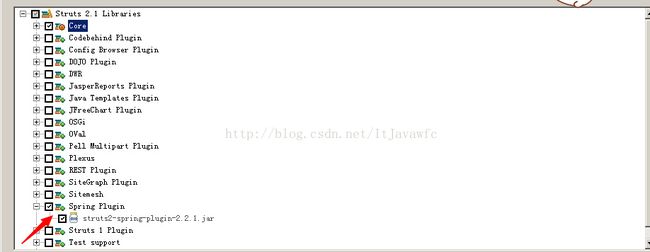Struts+Spring整合
整合Struts+Spring框架:
步骤:1)用MyEclipse搭建Struts框架和Spring框架,自动生成响应的配置文件
2)编写前台和后台简易的逻辑,实现框架的整合,理解整合要点。
利用MyEclipse工具实现环境搭建非常简单,搜一下相应文档资料,大胆尝试。
在生成Struts框架的时候,一定要将Spring的插件选中:
框架搭建以后,生成的struts.xml文件、applicationContext.xml、web.xml文件如下:
<?xml version="1.0" encoding="UTF-8" ?> <!DOCTYPE struts PUBLIC "-//Apache Software Foundation//DTD Struts Configuration 2.1//EN" "http://struts.apache.org/dtds/struts-2.1.dtd"> <struts> </struts>
<?xml version="1.0" encoding="UTF-8"?> <beans xmlns="http://www.springframework.org/schema/beans" xmlns:xsi="http://www.w3.org/2001/XMLSchema-instance" xmlns:p="http://www.springframework.org/schema/p" xsi:schemaLocation="http://www.springframework.org/schema/beans http://www.springframework.org/schema/beans/spring-beans-3.1.xsd"> </beans>
<?xml version="1.0" encoding="UTF-8"?>
<web-app xmlns:xsi="http://www.w3.org/2001/XMLSchema-instance" xmlns="http://java.sun.com/xml/ns/javaee" xsi:schemaLocation="http://java.sun.com/xml/ns/javaee http://java.sun.com/xml/ns/javaee/web-app_3_0.xsd" version="3.0">
<display-name>w</display-name>
<filter>
<filter-name>struts2</filter-name>
<filter-class>org.apache.struts2.dispatcher.ng.filter.StrutsPrepareAndExecuteFilter</filter-class>
</filter>
<filter-mapping>
<filter-name>struts2</filter-name>
<url-pattern>/*</url-pattern>
</filter-mapping>
<strong> <listener>
<listener-class>org.springframework.web.context.ContextLoaderListener</listener-class>
</listener>
<context-param>
<param-name>contextConfigLocation</param-name>
<param-value>classpath:applicationContext.xml</param-value>
</context-param></strong>
</web-app>理解一下Struts2中struts2-spring-plugin-2.3--.jar包的必要性:一旦web应用中安装了spring 插件,即可充分利用该插件的功能。
1)可以通过Spring来创建所有的Action
2)在Struts创建了某个对象之后,Spring将其以来的组件自动注入该对象。
3)提供拦截器来完成自动装配
除此之外,在使用Spring之前,必须完成Spring容器的初始化。为了完成 Spring的初始化,Spring提供了一个ContextLoaderListener类,该类可以作为Web应用的Listener使用,它会在Web应用启动时自动查找WEB-INF/下的applicationContext.xml配置文件,根据配置创建容器。
<listener>
<listener-class>org.springframework.web.context.ContextLoaderListener</listener-class>
</listener>
多个配置文件时:
有这样的配置即可
<context-param>
<param-name>contextConfigLocation</param-name>
<param-value>classpath:applicationContext.xml</param-value>
</context-param>
知道了配置之后,下面举个实际的小框架实现框架整合效果:
项目包图
代码:
LoginAction.java
package org.crazyit.struts2.action;
import com.opensymphony.xwork2.Action;
import org.crazyit.struts2.service.*;
public class LoginAction implements Action
{
// 下面是用于封装用户请求参数的两个属性
private String username;
private String password;
// 用于封装处理结果的属性
private String tip;
// 系统所用的业务逻辑组件
private MyService ms;
// 设值注入业务逻辑组件所必需的setter方法
public void setMs(MyService ms)
{
this.ms = ms;
}
// username属性的setter和getter方法
public void setUsername(String username)
{
this.username = username;
}
public String getUsername()
{
return this.username;
}
// password属性的setter和getter方法
public void setPassword(String password)
{
this.password = password;
}
public String getPassword()
{
return this.password;
}
// tip属性的setter和getter方法
public void setTip(String tip)
{
this.tip = tip;
}
public String getTip()
{
return this.tip;
}
// 处理用户请求的execute方法
public String execute() throws Exception
{
// 调用业务逻辑组件的valid方法来验证用户输入的用户名和密码是否正确
if (ms.valid(getUsername(), getPassword()))
{
setTip("哈哈,整合成功!");
return SUCCESS;
}
else
{
return ERROR;
}
}
}
MyService接口
package org.crazyit.struts2.service;
// 定义业务逻辑组件的接口
public interface MyService
{
boolean valid(String username , String pass);
}
MyService接口实现类 ,实现业务逻辑
package org.crazyit.struts2.service.impl;
import org.crazyit.struts2.service.*;
// 业务逻辑组件实现类,实现了业务逻辑组件接口
public class MyServiceImpl implements MyService
{
// 根据用户输入的用户名、密码来判断登录是否成功
// 实际应用中可能需要通过数据库记录进行判断
public boolean valid(String username , String pass)
{
if (username.equals("wfc")
&& pass.equals("wfc") )
{
return true;
}
return false;
}
}
配置文件applicationContext.xml
<?xml version="1.0" encoding="UTF-8"?> <beans xmlns="http://www.springframework.org/schema/beans" xmlns:xsi="http://www.w3.org/2001/XMLSchema-instance" xmlns:p="http://www.springframework.org/schema/p" xsi:schemaLocation="http://www.springframework.org/schema/beans http://www.springframework.org/schema/beans/spring-beans-3.1.xsd"> <!-- 部署一个业务逻辑组件 --> <bean id="myService" class= "org.crazyit.struts2.service.impl.MyServiceImpl"/> <!-- 配置Struts 2控制器对应的Bean实例 依赖注入业务逻辑组件 --> <bean id="loginAction" class="org.crazyit.struts2.action.LoginAction"> <property name="ms" ref="myService"/> </bean> <!-- <bean id="loginAction" class="org.crazyit.struts2.action.LoginAction" scope="prototype" p:ms-ref="myService"/> --> </beans>
struts.xml
<?xml version="1.0" encoding="UTF-8" ?>
<!DOCTYPE struts PUBLIC "-//Apache Software Foundation//DTD Struts Configuration 2.1//EN" "http://struts.apache.org/dtds/struts-2.1.dtd">
<!-- Struts 2配置文件的根元素 -->
<struts>
<constant name="struts.i18n.encoding" value="GBK"/>
<package name="lee" extends="struts-default">
<!-- 定义处理用户请求的Action,因此该Action由Spring负责创建
所以此处的class属性不是实际处理类 -->
<action name="loginPro" class="loginAction">
<!-- 配置了两个视图页 -->
<result name="error">/content/error.jsp</result>
<result>/content/welcome.jsp</result>
</action>
<action name="*">
<result>/content/{1}.jsp</result>
</action>
</package>
</struts>
登陆页面:Loginform.jsp
<%@ page contentType="text/html; charset=GBK" language="java" errorPage="" %> <%@ taglib prefix="s" uri="/struts-tags"%> <!DOCTYPE html> <html> <head> <meta http-equiv="Content-Type" content="text/html; charset=GBK" /> <title>登录页面</title> </head> <body> <h3>用户登录</h3> <s:form action="loginPro"> <s:textfield name="username" label="用户名"/> <s:textfield name="password" label="密码"/> <s:submit value="登录"/> </s:form> </body> </html>
成功登陆:welcome.jsp
<%@ page contentType="text/html; charset=GBK" language="java" errorPage="" %> <%@ taglib prefix="s" uri="/struts-tags"%> <!DOCTYPE html> <html> <head> <meta name="author" content="Yeeku.H.Lee(CrazyIt.org)" /> <meta http-equiv="Content-Type" content="text/html; charset=GBK" /> <title>成功页面</title> </head> <body> 您已经登录! <s:property value="tip"/> </body> </html>
登陆失败页面:error.jsp
<%@ page contentType="text/html; charset=GBK" language="java" errorPage="" %> <!DOCTYPE html> <html> <head> <meta name="author" content="Yeeku.H.Lee(CrazyIt.org)" /> <meta http-equiv="Content-Type" content="text/html; charset=GBK" /> <title>错误页面</title> </head> <body> 您不能登录! </body> </html>
实现效果:



